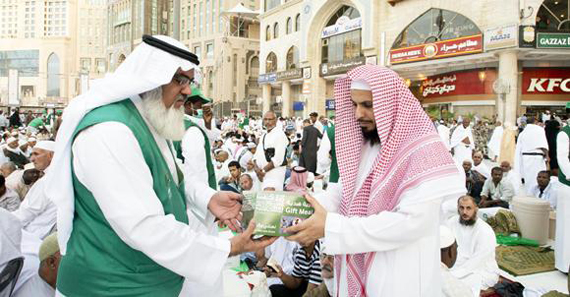
Riyadh, Aug 3: More than 1,300 volunteers work daily during the holy month of Ramadan to serve food on a plastic trail extending 4 kilometers along the ground of the Grand Mosque in Makkah.
The table is always full of coffee and dates to feed the crowds of pilgrims and visitors from inside and outside the Kingdom.
The administration at the Grand Mosque has also offered around 100,000 kg of de-pulped dates distributed inside 1,922,160 containers, with coffee on the side.
This giant table brings together many thousands of pilgrims from different nationalities, languages, ages and other features within safe and comfortable atmospheres.
Dr. Abdullah bin Abdul Aziz Al-Musleh, the secretary-general of the Muslim World League for the Scientific Miracles in the Qur’an, said this table represents an honored and proud image of the highest degree of hospitality that prevails every year during the holy month.
Dr. Saleh bin Muhammad Al-Taleb, imam and preacher at the Grand Mosque, said that there are over 1,300,000 meals being distributed to pilgrims during Ramadan, with the total length of the trail extending to 129 kilometers.
Mansour bin Amer, chairman of the Hadiyat Al-Haj wal Mu’tamir Charitable Society, said that his society is the first one of its kind that specializes in serving more than 15 million pilgrims every year.
He stressed the need to consolidate collective work in such a field to revive participation and teamwork within the integrated work of government agencies and charities.





Comments
Add new comment